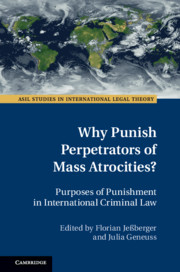Book contents
- Why Punish Perpetrators of Mass Atrocities?
- ASIL Studies in International Legal Theory
- Why Punish Perpetrators of Mass Atrocities?
- Copyright page
- Contents
- Contributors
- Preface
- Abbreviations
- 1 Introduction: The Need for a Robust and Consistent Theory of International Punishment
- 2 The Practical Importance of Theories of Punishment in International Criminal Law
- Part I Setting the Framework: Criminological, Historical and Domestic Perspectives
- Part II Rationales for Punishment in International Criminal Law: Theoretical Perspectives
- Part III Consequences for the Practice of the International Criminal Court
- 16 Prosecution Strategy at the International Criminal Court in Search of a Theory
- 17 Selectivity in International Criminal Law
- 18 Theories of Punishment in Sentencing Decisions of the International Criminal Court
- 19 Theories of Punishment at The Hague
- 20 From Punitive to Restorative Justice
- 21 Concluding Remarks
- Select Bibliography
- Index
16 - Prosecution Strategy at the International Criminal Court in Search of a Theory
from Part III - Consequences for the Practice of the International Criminal Court
Published online by Cambridge University Press: 07 February 2020
- Why Punish Perpetrators of Mass Atrocities?
- ASIL Studies in International Legal Theory
- Why Punish Perpetrators of Mass Atrocities?
- Copyright page
- Contents
- Contributors
- Preface
- Abbreviations
- 1 Introduction: The Need for a Robust and Consistent Theory of International Punishment
- 2 The Practical Importance of Theories of Punishment in International Criminal Law
- Part I Setting the Framework: Criminological, Historical and Domestic Perspectives
- Part II Rationales for Punishment in International Criminal Law: Theoretical Perspectives
- Part III Consequences for the Practice of the International Criminal Court
- 16 Prosecution Strategy at the International Criminal Court in Search of a Theory
- 17 Selectivity in International Criminal Law
- 18 Theories of Punishment in Sentencing Decisions of the International Criminal Court
- 19 Theories of Punishment at The Hague
- 20 From Punitive to Restorative Justice
- 21 Concluding Remarks
- Select Bibliography
- Index
Summary
Alex Whiting thoroughly analyzes the submissions by the ICC Office of the Prosecutor and statements made by the Prosecution. He explains the different approaches of the first and the second Prosecutor: The first embraced a theory of ‘disruption and specific deterrence’, seeking to intervene in real time to stop ongoing crimes with the Court being a force for diplomacy and peace. The second Prosecutor, on the other hand, focuses on the judicial tasks of the Court, chooses fewer cases, acts slowly and carefully. This way, the Court moved towards an expressive theory of punishment, investigations and cases are a way of expressing, shaping and enforcing norms. In the end, Whiting concludes that at the ICC’s Office of the Prosecutor theory does not dictate practice – it is the other way round: The Office’s strategy is reactive to and constrained by the dependency on state cooperation and the limits of the ICC’s authority. Only within those constraints, can theories of punishment play a role: ‘robust theories of punishment are a luxory of actors with power’.
Keywords
- Type
- Chapter
- Information
- Why Punish Perpetrators of Mass Atrocities?Purposes of Punishment in International Criminal Law, pp. 285 - 304Publisher: Cambridge University PressPrint publication year: 2020

